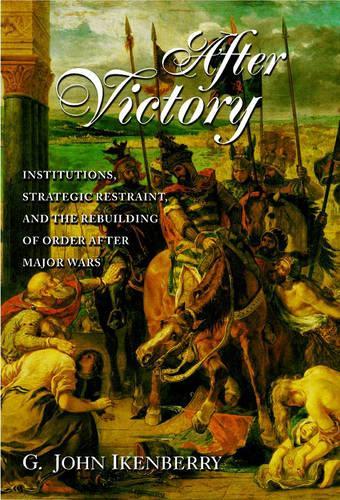
After Victory: Institutions, Strategic Restraint, and the Rebuilding of Order after Major Wars
(Paperback)
Available Formats
Paperback
Published: 15th January 2001
Hardback
Published: 25th June 2019
Paperback, New Edition
Published: 25th June 2019
Publishing Details
After Victory: Institutions, Strategic Restraint, and the Rebuilding of Order after Major Wars
By (Author) G. John Ikenberry
Princeton University Press
Princeton University Press
15th January 2001
United States
Classifications
Professional and Scholarly
Non Fiction
International relations
General and world history
327
Physical Properties
Paperback
312
Width 152mm, Height 235mm
454g
Description
The end of the Cold War was a "big bang" reminiscent of earlier moments after major wars, such as the end of the Napoleonic Wars in 1815 and the end of the World Wars in 1919 and 1945. Here John Ikenberry asks the question, what do states that win wars do with their newfound power and how do they use it to build order In examining the postwar settlements in modern history, he argues that powerful countries do seek to build stable and cooperative relations, but the type of order that emerges hinges on their ability to make commitments and restrain power. The author explains that only with the spread of democracy in the twentieth century and the innovative use of international institutions--both linked to the emergence of the United States as a world power--has order been created that goes beyond balance of power politics to exhibit "constitutional" characteristics. The open character of the American polity and a web of multilateral institutions allow the United States to exercise strategic restraint and establish stable relations among the industrial democracies despite rapid shifts and extreme disparities in power.Blending comparative politics with international relations, and history with theory, After Victory will be of interest to anyone concerned with the organization of world order, the role of institutions in world politics, and the lessons of past postwar settlements for today. It also speaks to today's debate over the ability of the United States to lead in an era of unipolar power.
Reviews
Winner of the Jervis-Shroeder Best Book Award "After Victory show[s] how international governance can serve the interests of hegemonic powers."--Robert Wright, The New York Times "This is a thought-provoking and elegantly written book and an important contribution to our understanding of postwar orders and institutions."--Peter Liberman, Political Science Quarterly "After Victory is a majestic work that combines many familiar but seemingly unrelated themes into one elegant package of exceptional theoretical and empirical sweep... It should have an enduring impact on the study and practice of international relations."--Randall L. Schweller, Journal of Politics "This pathbreaking work is one of the most important studies on international order to appear in many years. It will be required reading for all students and scholars of international relations."--Choice "The liberal argument that democratic regimes can make a dramatic difference in world affairs has finally achieved intellectual respectability, as this fine book so convincingly maintains."--Tony Smith, Foreign Affairs "An elegant, penetrating study about the creation and maintenance of international order in global society... This pathbreaking work is one of the most important studies on international order to appear in many years. It will be required reading for all students and scholars of international relations."--Choice "This is unquestionably one of the most important books in the field of the past decade."--International Affairs
Author Bio
G. John Ikenberry is Professor of Government and International Affairs at Georgetown University and Non-Resident Senior Fellow at the Brookings Institution. He has published widely in the field of international relations and has, most recently, coedited American Democracy Promotion: Impulses, Strategies, and Impacts and The Emerging International Relations of the Asia Pacific Region (forthcoming). He is the author of Reasons of State: Oil Politics and the Capacities of American Government.
